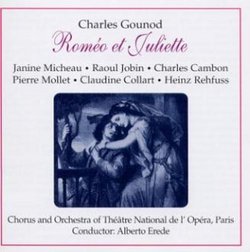| All Artists: Charles Gounod, Alberto Erede, Paris Orchestre de l'Opéra National, Paris National Opera Orchestra, André Philippe, Camille Rouquetty, Charles Cambon, Claudine Collart, Heinz Rehfuss, Janine Micheau, Louis Rialland, Odette Riquier, Pierre Mollet, Raoul Jobin Title: Gounod: Rom�o et Juliette Members Wishing: 0 Total Copies: 0 Label: Preiser Records Original Release Date: 1/1/2005 Re-Release Date: 8/30/2005 Genre: Classical Styles: Opera & Classical Vocal, Historical Periods, Modern, 20th, & 21st Century Number of Discs: 2 SwapaCD Credits: 2 UPC: 717281200417 |
Search - Charles Gounod, Alberto Erede, Paris Orchestre de l'Opéra National :: Gounod: Rom�o et Juliette
 | Charles Gounod, Alberto Erede, Paris Orchestre de l'Opéra National Gounod: Rom�o et Juliette Genre: Classical |
Larger Image |
CD Details |
CD ReviewsAuthenticity, and a lovely Juliette Charlus | NYC | 01/15/2006 (3 out of 5 stars) "
Juliette: Janine Micheau Roméo: Raoul Jobin Frère Laurent: Heinz Rehfuss Mercutio: Pierre Mollet Capulet: Charles Cambon Stéphano, a page: Claudine Collart Thibaut: Louis Rialland Paris: Camille Rouquetty Gertrude: Odette Ricquier Grégorio André Philippe Le duc de Vérone André Philippe Ch?urs et Orchestre du Théâtre National de l' Opéra de Paris conducted by Arberto Erede Recording: English Decca [USA: "London Records"; "Richmond Opera Collection"] Paris, 1953. This is one of the last recorded documents of the Old Order at the Palais Garnier and, as such, an interesting historical artifact. The conducting is pretty leaden, the chorus sound like a nursing home at full flight and the Romeo is provincialism writ large (and loud!) Yet ALL the principals are native French speakers (the Romeo pretty decisively of la belle province: his "Comment?" to Mercutio in Act I situates him a lot closer to the Jardin des Ursulines at Trois-Rivières than the Place de l' Opéra) and there is a sense of rightness and understanding to what they do that is missing from any of the more recent sets. Authenticity, you know? The legendary qualities of the famed Opéra orchestra do come through from time to time, as in the lovely rêverie that introduces the Balcony Scene. This is the only recording that includes the full ballet music that Gounod composed for the work's 1888 introduction into the Opéra (the original première had been at the Théâtre Lyrique, in 1867,) when Adelina Patti was persuaded to learn Juliette in French to partner the storied Beau Idéal, Jean de Reszke, as Roméo. Nothing in that fabulous order of things is to be heard here, but I must admit to loving Janine Micheau's Juliette. She had been at the Opéra since the 30s, and her early HochKoloratur days were behind her when this performance was taped. (All the more puzzling that she sings the famous Waltz song in the original key of G, when Gounod himself had transposed it down to F for Patti.) But she gives forth many ravishingly beautiful phrases in the more lyric parts, with that uniquely lovely, burnished voice of hers. She never much cared about making recordings, but there are more than a few hints in this one to suggest why she was, for so long, adored by her Parisian public. At the price, and in fine sound, this Preiser re-issue is quite tempting. " |
